Laddie's World
Socializing Your Collie
 What is socialization?
What is socialization?
Socialization is the process in which someone or something is exposed (or introduced) to someone, something or different situations. When good socialization occurs, the person (or in this case a puppy or dog) should come out of the experience with the feeling that it is okay to be near or in that circumstance without fear of danger to itself.
When these types of experiences continually happen on a consistent basis, than that puppy stands a better chance of growing up to become a well adjusted dog able to confidently approach just about anything life presents to it. Life with a lack of good socialization often produces dogs with serious and occasionally potentially dangerous issues. In fact, some of the most common everyday behaviors that people have come to expect as normal in dogs could have easily been prevented by early socialization along with a little good training.
A common example of how a little socialization could have prevented an issue would be a dog aggressively reacting to the mailman or any other uniformed visitor that chanced to walk up to the door.
If that dog as a puppy had been introduced to the mailman, fireman, UPS person and even police officers in uniform with positive encouragement (and a treat or two!) than that puppy would have very early learned that uniformed people are a positive thing and would be more likely to accept (or at the very least tolerate) their presence.
Remember, too, that socialization should not be confused with training. Many well socialized dogs have little or no training and they are very nice dogs. Conversely, many well trained dogs are very poor candidates for even a walk outside of their own yard because of their aggressions.
So, now your next question should invariably be, "Okay. I understand WHAT socialization is... But how do I go about this?"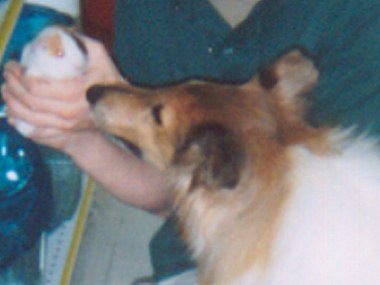
Well, with puppies the rule is generally 'Get them out and take them everywhere and anywhere you can from the moment you get them home no mater how young they are. It is generally considered that weeks 7-16 are the most critical opportunity for good socialization, but it is important to continue to expose your puppy to sights, sounds, animals, and people through out the first year or two of his life. Otherwise, your puppy may become fearful and timid, and suffer from unnecessary stress throughout his life.
Be cautious during weeks 8 to 9 though. Many breeds and individual dogs have what is often termed a fear period during that time. A fear period is a time when the puppy will appear to have a heightened fear response to something or someone he doesn't yet know or understand. If your puppy seems unusually hesitant around that time, wait a week or so before taking him out again. It only takes an average dog one major negative stimulus during a fear stage to create a possible life long issue. Take special care during this stage to only allow positive interactions.
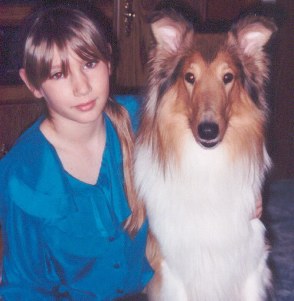 Now that doesn't mean that you can't take him anywhere, or on the other hand, leave him at home alone, after all, he'll have to be socialized to that aspect of his life as well. But what it does mean is that if you are going to pet stores that allows pets, going for a walk, taking your son to little league practice or just driving down to the corner store for some milk and you have the time to oversee the interactions so that they occur safely and in a positive manner, than take the puppy with you. If you don't have the time or you don't have anyone old enough or capable enough of helping you, than don't take the chance of something negative happening. Leave the puppy home until next time.
Now that doesn't mean that you can't take him anywhere, or on the other hand, leave him at home alone, after all, he'll have to be socialized to that aspect of his life as well. But what it does mean is that if you are going to pet stores that allows pets, going for a walk, taking your son to little league practice or just driving down to the corner store for some milk and you have the time to oversee the interactions so that they occur safely and in a positive manner, than take the puppy with you. If you don't have the time or you don't have anyone old enough or capable enough of helping you, than don't take the chance of something negative happening. Leave the puppy home until next time.
Remember that just as with positive experiences, negative experiences can influence the way a puppy matures and interacts as well. Hold your puppy while you stand in front of a mall entrance and let passersby say hello. Go to schools, shopping centers, nursing homes, and (after vaccinations) take walks with him in different neighborhoods. Keep a pocketful of treats to give to adults and children to give to your pup - this will solidify a positive association with strangers in his mind.
Even before his vaccines, invite friends and relatives, particularly young children, to your house often. Keep a bowl of puppy food by the door so visitors can treat him when they arrive. Try having a "puppy party" and arrange for your guests to arrive at fifteen minute intervals so the puppy has an opportunity to meet everyone individually without becoming overwhelmed.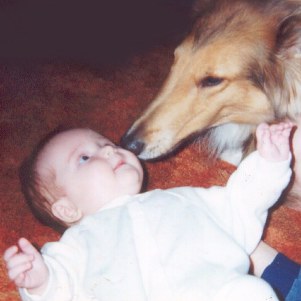
People to socialize your dog to should include the following: Adults (men, women, different sizes, shapes, ethnic backgrounds, facial hair), Crying babies, Toddlers, Young children, Teenagers, Delivery people, Postal service employees, Gardeners, People in uniform, People in wheelchairs, People walking with canes, People with umbrellas, People who are loud, People who are shy, People with big boots and other types of various clothing including hats, thick or flapping jackets, military type fatigues and even bell-bottomed pants.
Additionally, many puppies that are never introduced to babies have a hard time later on adjusting to new family members. Many dogs become aggressive with children, not because they have been teased by them (although that does happen a lot), but because they are simply not socialized (or accustomed) to the way they look, act, and sound. Please remember to always have your puppy on leash and under control. Especially around children.
Once he's had his Kennel Cough vaccine and 2nd Distemper/Parvo vaccines, your pup can and should play with other vaccinated puppies and friendly adult dogs as frequently as possible. Introduce your puppy to other puppies of different sizes, shapes, hair length, and age. Many dogs become afraid of other dogs simply because they have not had the opportunity to mingle with their own kind.
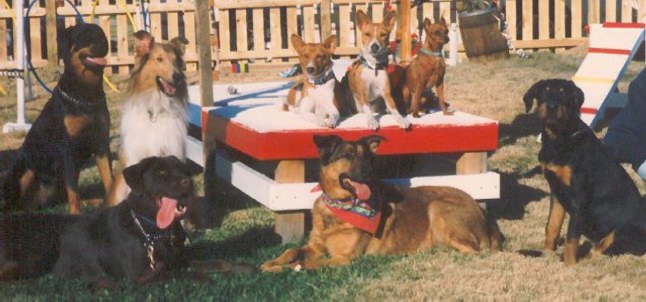
Dog to dog aggression (fear-based) is a very sad behavior problem that can take months to overcome at older ages. Bring him to the local park to play with other friendly dogs. Bring him to your local pet store. Dog daycare is also an excellent place for your puppy to get socialized while you're at work. Sign up for a puppy kindergarten class. In those classes puppies will learn how to get used to other types of dogs and what proper social dog etiquette is. Depending on the ages and the environment the class takes place in, the first time pups may be introduced to each other on leash. Some folks will even have a "puppy party" at their home with other puppies and their owners.
When he's playing with puppies his own age, he may be shyer or more aggressive than the others. This is normal. Try not to pick up a shy pup or scold a boisterous one. He needs to learn his canine social skills from the other pups. They'll let him know what's OK and what's not.
Remember that there is more of a chance for trouble to start if the dogs are restrained. Owners often inadvertently teach their puppy to become fearful or aggressive by the way they respond to a "scary" situation and handle the leash. Most interactions can be handled before they happen. The voices or positions of all the participating humans can also correct inappropriate behavior. Sharing of toys, water dishes, and varied interactions with other owners and their pets all contribute to a well-rounded dog.
Some people think having a dog or two at the home is enough to properly socialize a puppy, but it is not. Dogs in the home are part of the puppy's immediate family. It is also not uncommon for the dogs sharing a home to actually develop their own social queues that may differ dramatically from regular canine social queues. Too many good natured puppies have learned from the wrong outside dogs that running up to another dog's face enthusiastically isn't a normal queue to play. Besides, it's good for your pup to have friends of his or her own. They can and will learn critical social skills in a painless manner and often will wear themselves out in a short hour. This is great for the tired owner who can often enjoy the sleeping puppy for at least one day a week! This social interaction also prepares them for some more serious training later since it is separate from a regular training class.
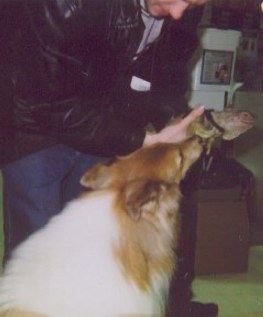
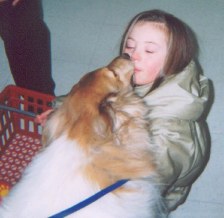 Social activities and schooling should be distinguished for the pup. School is for learning and social time is for play, even though they do learn important skills in that social time.
Social activities and schooling should be distinguished for the pup. School is for learning and social time is for play, even though they do learn important skills in that social time. Some of the more valuable things learned through socialization is how to approach another dog, what is acceptable with other dogs, what other breeds look like, and how to behave around other people.
Environmental socialization can include anything that surrounds a puppy or dog on a daily or very regular basis. Clanging and banging (things dropped, things banged/clanged), Sirens, Trash trucks, Motorcycles, Balloons, Veterinary offices, Groomers, Boarding kennels, Shopping malls, Schools, Others' homes, and even Dog shows. Perhaps there is a small "MOM and POP" hardware store around that will let dogs in. Be creative but be safe.
A few additional socialization recommendations can include Cats, Birds, Horses, Cattle, and any other animal you want them comfortable with.
FINAL NOTES:
Watch your puppy or dog's body language. If at anytime during a socialization experience your puppy or dog begins to show any sign of nervousness, fear or uncertainty, try not force him forward. If it's safe, encourage investigation with your verbal encouragement and let him investigate on his terms when he is ready. It can also be helpful to walk a few steps away in the other direction to allow for a safe zone that may help your unsure puppy calm quickly and feel more secure. Try to encourage him to get a little closer again but be patient. Some things can take some getting used to. Remember to praise all the good behavior he displays as well as any attempts to investigate something he's not to sure of.
COMING SOON
BASIC BODY LANGUAGE SIGNALS, QUEUES AND BEHAVIORS EXPLAINED
 What is socialization?
What is socialization? 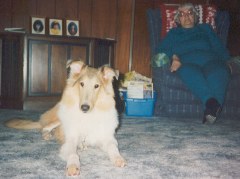

 Now that doesn't mean that you can't take him anywhere, or on the other hand, leave him at home alone, after all, he'll have to be socialized to that aspect of his life as well. But what it does mean is that if you are going to pet stores that allows pets, going for a walk, taking your son to little league practice or just driving down to the corner store for some milk and you have the time to oversee the interactions so that they occur safely and in a positive manner, than take the puppy with you. If you don't have the time or you don't have anyone old enough or capable enough of helping you, than don't take the chance of something negative happening. Leave the puppy home until next time.
Now that doesn't mean that you can't take him anywhere, or on the other hand, leave him at home alone, after all, he'll have to be socialized to that aspect of his life as well. But what it does mean is that if you are going to pet stores that allows pets, going for a walk, taking your son to little league practice or just driving down to the corner store for some milk and you have the time to oversee the interactions so that they occur safely and in a positive manner, than take the puppy with you. If you don't have the time or you don't have anyone old enough or capable enough of helping you, than don't take the chance of something negative happening. Leave the puppy home until next time.

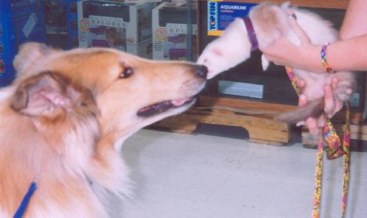

 Social activities and schooling should be distinguished for the pup. School is for learning and social time is for play, even though they do learn important skills in that social time.
Social activities and schooling should be distinguished for the pup. School is for learning and social time is for play, even though they do learn important skills in that social time.